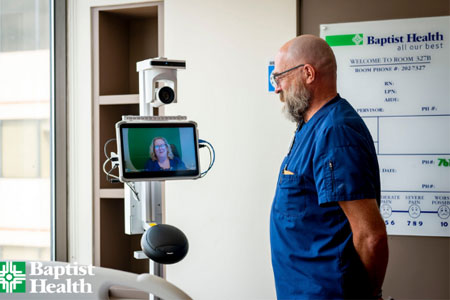Baptist Health and Caregility are pleased to announce an expanded partnership aimed at enhancing patient care across the Arkansas-based healthcare organization.
Baptist Health will enhance its bedside care teams by increasing its usage of Caregility intelligent telehealth devices to more than 700 bedsides system-wide, doubling the footprint of the healthcare organization’s inpatient telehealth services. The initiative adds virtual clinical resources to support in-person bedside care and help improve patient outcomes. This collaboration underscores both organizations’ commitment to leveraging technology to transform healthcare delivery and meet the evolving needs of patients and staff.
The enhanced partnership builds upon Baptist Health’s previous success with virtual admissions and discharge programs, currently supported by more than 300 wall-mounted and cart-based Caregility telehealth devices across 11 hospitals. Since partnering on virtual care services with Caregility in 2021, telehealth session volume for Baptist Health has increased from roughly 1,000 virtual visits per quarter to more than 20,000.
In early 2023, Baptist Health Rehabilitation Institute successfully launched Arkansas’ first virtual nursing program to provide additional support to bedside nurses, patients and families. The program then expanded to the healing ministry’s hospitals in Stuttgart, Malvern and Heber Springs. Thanks to positive patient outcomes and feedback, Baptist Health will roll out virtual care programs on every medical and surgical floor across the organization.
As part of this expansion, Baptist Health will deploy Caregility’s new, highly advanced telehealth devices and award-winning Caregility Cloud™ virtual care platform in more than 500 additional patient rooms at the health system’s flagship hospital, Baptist Health Medical Center-Little Rock, as well as Baptist Health Medical Center-North Little Rock and Baptist Health-Fort Smith. These devices will support the expansion of virtual nursing and the rollout of virtual support staff and virtual providers in the coming months. Additionally, a centralized hub to support virtual nursing and virtual sitters has opened on the Baptist Health Medical Center-Little Rock campus.
“Embracing virtual support as part of our acute care bedside support and quality strategy signifies a pivotal step forward in how we envision the future of healthcare at Baptist Health,” said Kourtney Matlock, president of Baptist Health Rehabilitation Institute and system post-acute services. “Baptist Health first added virtual care in 2005, and we have continued to advance with the latest technology bringing us to where we are today with our partnership with Caregility. This expansion is more than an initiative; it’s a commitment to providing health equity across our state, setting new standards in patient and provider satisfaction, and furthering our mission to be the employer of choice in Arkansas.”
The partnership exponentially increases the eyes and ears able to focus on patients, reducing pressure on bedside staff by redistributing tasks that a virtual nurse or support staff can field. As a result of increased telehealth services in acute care settings, healthcare systems see significant time savings and improved throughput (the process of moving patients through the hospital system from admission to discharge). Having virtual options at the bedside appeals to patients as well, as evidenced by improved patient satisfaction ratings in early field trials.
“We are at a point where this type of care model is not an option for our health systems, it is the only way they can address staffing issues and remain competitive,” said Caregility President and COO Mike Brandofino. “This partnership with Baptist Health is a great example of how Caregility can make it easy to deploy intelligent devices and services to enhance patient care through virtual programs.”
Caregility Cloud™ allows health systems to easily centralize and scale programs such as Virtual Nursing, Virtual Patient Observation, Virtual Rounding, and Virtual Consultations in inpatient settings, improving staffing flexibility and workflow efficiency and making it easier to engage remote specialists and interpreters to support patient access and health equity. Trusted by more than 1,000 U.S. hospitals for high reliability, the platform is favored for its adaptability to a multitude of workflows and integrations with clinical platforms, including Epic.


